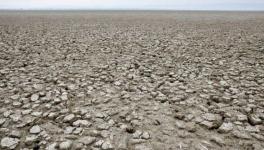Human Activities on Land Account for 23% of Greenhouse Gas Emission: IPCC

Image for representational use only.Image Courtesy : Stockholm Environmental Institute.
Land, which is part of the solution to climate challenges, is already under growing pressure due to human activities as also climate change, said the report of IPCC (Intergovernmental Panel on Climate Change) released on Thursday. According to the report, Climate Change and Land, keeping global warming below 2 degree Celsius can only be achieved if carbon emissions from all sectors, including food and land, are reduced.
“Land plays an important role in the climate system. Agriculture, forestry and other types of land use account for 23 per cent of human greenhouse gas emissions. At the same time, natural land processes absorb carbon dioxide equivalent to almost a third of carbon dioxide emissions from fossil fuels and industry” said Jim Skea, Co-Chair of IPCC Working Group III.
“Land already in use could feed the world in a changing climate and provide biomass for renewable energy, but early, far-reaching action across several areas is required," said Hans-Otto Portner, Co-Chair of IPCC Working Group II.
Land must remain productive for the maintenance of food security for the growing population of the world when climate change is showing the negative impacts. The report says that when land is degraded, it becomes less and less productive and hence less production of food grains. Land degradation also leads to reducing soil’s ability to absorb carbon. This acts like a loop—land degradation leads to less carbon storage of land which exacerbates climate change, again climate change exacerbates land degradation in too many ways. It also takes long time for trees and soils to store carbon. Land is a critical resource.
The global food system contributes to one-third of the total greenhouse gas emissions and it needs an urgent change, says the report.
The IPCC special report encompasses climate change, desertification, land degradation, sustainable land management, food security and greenhouse gas fluxes in terrestrial ecosystems. In producing the report 108 experts from 52 countries were involved as coordinating lead authors, lead authors and review editors engaged in preparing different chapters that the report contains.
In 2015, governments backed the Paris Agreement goal to strengthen the global effort to hold the global increase in temperature below 2 degree Celsius above pre-industrial levels and also to formulate measures to limit the increase to 1.5 degree Celsius. To realise the goals of the Paris Agreement, greenhouse gas emissions from all sectors have to be curbed.
Land, its fertility, productivity and the quality of the products are all related to global food security chain. As human activities have made tremendous pressure on lands and also the changing climate has the effect on it, this report is of special interest for the future viability of global food security. The report will also be a key scientific input into the forthcoming COP14 in New Delhi in September and COP25 in Santiago, Chile to be held in December.
The report says that a proper management of land resources can help address climate change and is also beneficial for the conservation and restoration of ecosystems and biodiversity. The choices we make about sustainable land management can help reduce and in some cases reverse these adverse impacts," said Kiyoto Tanabe, Co-Chair of the Task Force on National Greenhouse Gas Inventories.
The report emphasises that only a coordinated action to address climate change can improve land, food security and nutrition—a package to help ending hunger.
The report highlights that all four pillars of food security—availability, access, utilisation and stability, are getting affected by the climate change.
“Food security will be increasingly affected by future climate change through yield declines, especially in the tropics, increased prices, reduced nutrient quality, and supply chain disruptions," said Priyadarshi Shukla, Co-Chair of IPCC Working Group III.
Get the latest reports & analysis with people's perspective on Protests, movements & deep analytical videos, discussions of the current affairs in your Telegram app. Subscribe to NewsClick's Telegram channel & get Real-Time updates on stories, as they get published on our website.
















